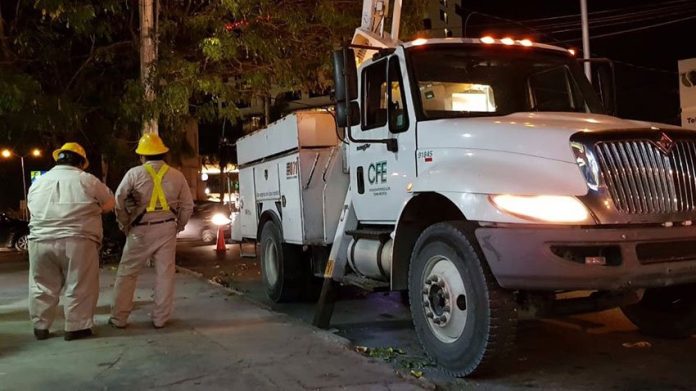A power outage left part of Mérida in the dark last night just hours after the National Energy Control Center (Cenace) announced its intention to declare a state of emergency on the Yucatán peninsula due to a lack of natural gas to generate energy.
Lights went off in the west of the city just after 10:00pm and power hadn’t returned by midnight, according to a report published early this morning by the newspaper El Universal.
Cenace said in a statement earlier yesterday that in the coming months – it didn’t specify when – there will be a shortage of natural gas on the Yucatán peninsula and power stations in Mérida, Campeche and Valladolid will operate at only 25% capacity.
The Mérida III combined-cycle plant will operate at half-capacity during high-demand daylight hours but will disconnect from the grid completely during low-demand periods, the federal agency said.
At least 985 megawatts (MW) of power are needed to guarantee power supply on the Yucatán peninsula but it is anticipated that output could fall to as low as 732 MW.
“In that context, while dispatchable generation is less than 985 MW. . . we inform . . . that a state of operational emergency will be declared for the Yucatán peninsula . . .” Cenace said.
While an emergency declaration is in effect, Cenace may issue special instructions to citizens with regard to energy use or prioritize electricity supply to certain areas of the Yucatán peninsula’s cities and towns.
“. . . It doesn’t mean that there won’t be power but in such a case . . . Cenace can take extraordinary measures,” said Paul Sánchez, founder of Ombudsman Energía México, a civil society organization.
Today, however, Cenace backed away from the declarations it made Monday.
In an “explanatory note,” it said that it has asked the national gas network to make a “greater effort” to transport larger quantities of natural gas to the peninsula, which will increase availability at the three power stations where capacity was to be cut.
Cenace also noted that the Federal Electricity Commission is building a new stretch of pipeline from the port city of Campeche that will be capable of proving diesel to power stations on the peninsula 24 hours a day, adding that transmission lines between Ticul, Yucatán, and Escárcega, Campeche, can provide backup energy supply if required.
“The declaration of a state of operational emergency” referred to in yesterday’s statement “at this time has no foundation . . .” Cenace said.
However, as last night’s blackout indicates, power supply issues on the Yucatán peninsula are far from resolved.
Residents have already suffered three widespread blackouts this year, one in March and two in April.
The first two outages were blamed on fires beneath transmission lines but energy expert Edgar Ocampo Telléz said that a lack of gas to generate power was the real reason.
He warned in April that an increased demand for energy in the warmest months of the year and a shortage of gas will cause more power outages on the Yucatán peninsula.
The electricity commission insisted in April there would be no more outages and that there was no shortage of natural gas.
Source: El Universal (sp), El Financiero (sp), Notimex (sp)
